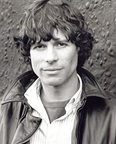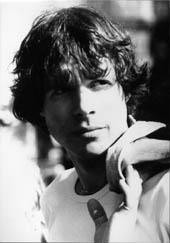“As for me, I merely wish, some day, to relate well and in the most casual
of words the most important thing that I know and that can be put into words.
A desire, an emotion, a place, some sort of light or sound, whatever would
constitute a fragment of our world and belong to us all.”
Bernard-Marie Koltès
ABOUT THE AUTHOR
April
9, 1948: Born in a middle-class family in the Eastern French town of Metz,
where he attended the music conservatory. Bernard was the rebellious son of
an army officer  who
actively participated in the French decolonization wars between 1946 and 1962.
As a teenager, Bernard witnesses all Arab nationals being rounded up and relocated
to a ghetto in Metz during the Algerian War.
who
actively participated in the French decolonization wars between 1946 and 1962.
As a teenager, Bernard witnesses all Arab nationals being rounded up and relocated
to a ghetto in Metz during the Algerian War.
1958-1966: Koltès attends Metz’s Saint Clément School.
Trained by his Jesuit masters in classical rhetoric, he reads Jules Verne,
Victor Hugo and Shakespeare extensively. Trying to emulate one of his first
idols, Arthur Rimbaud, he begins composing poems in the mid-‘60s. Fond
of Fellini and Antonioni, he develops an interest in American cinema as well
(Welles,Kazan, Hitchcock).
1967: He enrolls in journalism school but drops out and decides never to work
for a salary.
1968: He takes his first trip New York City, where he discovers the intense
emotions of the city and American gay culture. After seeing Maria Casares
in Jorge Lavelli’s production of Medee by Pierre Corneille, he realizes
that he should write for the theater.
1970: He moves to the Eastern town of Strasbourg, where he take a stage management
course. He joins the Théâtre National de Strasbourg as an apprentice-stage
manager.
1971: He writes and directs his first plays, Procès Ivre, based on
Dostoevski’s Crime and Punishment, and La Marche, based on the Song of
Songs.
1973: Koltès travels to the Soviet Union and reads both Russian fiction
and drama as well as Marx’s and Lenin’s works.
1974: He joins the French Communist Party and remains a member until 1978.
He develops an interest in Latin American writers, such as Gabriel Garcia
Marquez and Carlos Fuentes.
1975: Unable to write, he attempts suicide.
1976: He is treated for drug addiction. Later he begins to work on the novel
that will become La fuite à cheval très loin de la ville.
1977: Bruno Boëglin of Lyons’ Théâtre de l’Eldorado
commissions and produces Sallinger, based on J.D. Salinger’s short stories.
La Nuit juste avant les forêts premieres at the Avignon Theatre Festival.
Koltès visits Nicaragua.
1978: travels to Guatemala, Mexico, Nigeria.
1979: He travels to Mali and the Ivory Coast. Joseph Conrad and Herman Melville
become his favorite authors and he begins work on Combat de nègre et
de chiens. Back in Paris, he meets director Patrice Chéreau, who will
become the predominant director of Koltès in France.
1980s: When not departing for frequent travel to West Africa, Latin America,
or New York, Koltès frequently returned to the Barbes district in Paris
to watch karate movies. One of his heroes is Bruce Lee, and he sees a parallel
between ritualized rhetoric and the movements of martial arts.
 1981:
The Twilight Zone introduces Koltès’ writing to English-speaking
London. Works on a commission by the Comédie Française, which
will become Quai Ouest, and one commissioned by London’s Almeida Theatre,
which will become Dans la solitude des champs de coton.
1981:
The Twilight Zone introduces Koltès’ writing to English-speaking
London. Works on a commission by the Comédie Française, which
will become Quai Ouest, and one commissioned by London’s Almeida Theatre,
which will become Dans la solitude des champs de coton.
1982: He visits New York again.
1983: Combat de nègre et de chiens premieres at Nanterre’s Théâtre
des Amandiers directed by Patrice Chereau’s. Koltès reads William
Faulkner and William Styron and meets Jean Genet and James Baldwin. Bernard
feels effects of AIDS.
1984: He travels to Senegal and publishes his novel La fuite à cheval
très loin de la ville.
1986: Produced by Patrice Chéreau, Quai Ouest premieres in Nanterre.
1987: Dans la solitude des champs de coton premieres in Nanterre.
1988: Koltès adapts Shakespeare’s The Winter’s Tale, produced
by Luc Bondy in Nanterre.
1989: He travels to Guatemala, then Lisbon, where he starts working on a film
script about the ivory trade. Due to his deteriorating health, he returns
to France.
1989: Bernard-Marie Koltès dies at Paris’ Laennec Hospital, on
April 15 at age 41. He is buried in the Montmartre Cemetery. Though always
popular in France and Germany, Koltès begins to gain a place in other
countries’ theaters. His work has already been performed in Germany,
France, Holland, the Netherlands, Scandinavia and in the next decade will
travel to London and New York.
1990: Traverse Theatre in Scotland premieres The Struggle of the Dogs and
the Black. Roberto Zucco premieres in Berlin, followed by 17 separate German
productions in the next five years.
1994: Royal Scottish Academy of Music & Dance holds Festival Koltès.
1995: The Editions de Minuits publish Sallinger and commits to the publications
of Koltès’ other early plays. Roberto Zucco opens in London (first
English production?). In the Solitude of the Cotton Fields runs at the Edinburgh
Festival.
1999: Quay West is first performed in English (?) in Dublin.
Works
by KOLTES
La Fuite à cheval très loin dans la ville,
roman, 1984
Les Amertumes, théâtre, 1998 présentation par
l'éditeur
L'Héritage, théâtre, 1998 présentation par l'éditeur
Sallinger, théâtre, 1995
La Nuit juste avant les forêts, théâtre, 1990 en savoir
+
Quai Ouest, théâtre, 1985 en savoir +
Combat de nègres et de chiens, Carnets, théâtre, 1983-1989
Dans la solitude des champs de coton, 1986
Le Conte d'hiver (adaptation of Shakespeare’s Winter’s Tale), 1988
Le Retour au désert, théâtre, 1995
Prologue et autres textes, 1991
Roberto Zucco suivi de Tabataba, théâtre, 1995
Une part de ma vie, entretiens, 1983-1989 présentation par l'éditeur
Procès ivre, roman, 1971 présentation par l'éditeur